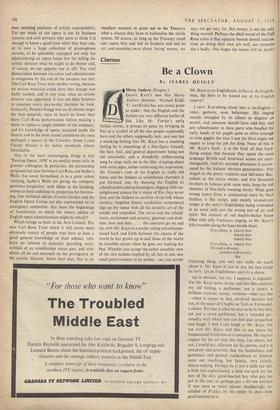Cinema
Be a Clown
By ISABEL QUIGLY Merry Andrew. (Empire.) DANNY KAYE'S new film Merry Andrew (director : Michael Kidd; 'U' certificate) has one comic point to make : that the English and the Italians are very different kettles of fish. Like Mr. Forster's early Italian stories, it presses its point by bringing in Pan as a symbol of all the one people supposedly have and the others supposedly lack; and one has a sneaking feeling that Mr. Kaye has a sneaking feeling he is something of a Pan-figure himself, the face, hair, and general deportment being not too unsuitable, and a dreadfully embarrassing song he sings early on in the film, skipping about with some pipes, rather confirming the impression. Mr. Forster's view of the English as stuffy old bores and the Italians as uninhibited charmers is put forward, too, by showing the English as schoolmasters and archaeologists, digging with un- enlightened science for a statue of Pan they never find, and the Italians as carefree circus folk whose monkey Angelina (heavy symbolism somewhere) digs up the statue with all the intuitive art of the simple and unspoiled. The circus and the school- room, excitement and security, glamour and drab- ness, love and duty . . . the contrasts go on and on, with Mr. Kaye as a tender young schoolmaster tossed back and forth between the claims of the world he has grown up in and those of the world he stumbles across when he goes out looking for Pan. Whether you accept the rather unsubtle view of the two nations implied by all this or not, one small point remains to be settled : can you accept Mr. Kaye as an Englishman, in fact as the English- man, the hero to be wooed out of his English reserve?
I can't. Everything about him is un-English--- voice, gestures, even behaviour. His singing sounds strangled by its efforts to disguise an accent, and someone should have told him that any schoolmaster in these parts who fondled the curly heads of his pupils quite as often (enough to raise giggles the time I saw the film) might not expect to keep his job for long. None of this is Mr. Kaye's fault : it is the fault of that hard- dying notion that because they speak the same language British and American actors are inter- changeable. And his national phoniness is accent- uated by the Italians' obvious genuineness : Pier Angeli as the pretty trapezist and Salvatore Bac- calloni as the circus owner, and five ferocious brothers in hideous pink satin vests, keep the old chestnut of Pan-Italy roasting nicely. What goes wrong (apart from a sentimental story by Paul Gallico, a flat script, and mostly second-rate songs) is the story's Englishness being embodied in an actor with just the wrong sort of air and spirit. No amount of red double-decker buses filled with jolly Cockneys singing, as Mr. Kaye's bike trundles along the lanes beside them, Everything is tickety-boo tickety-boo tickety-boo Everything is tickety-boo On such a dreamy peaches-and-creamy day
(rhyming slang, you see) can really do much about it. Mr. Kaye is cast as just the two things he isn't : (a) an Englishman, and (b) a clown.
(a) is obvious, but (b), I suppose, is arguable. Yet Mr. Kaye seems to me, and this film confirms my old feeling, a performer, not a clown; a brilliant trickster, mimic, virtuoso—what you like —when it comes to fast, involved sketches but not, in the sense of Chaplin or Toto or Fernandel, a clown. Yet that is what he tries to be in this film, not just a revue performer, but a rounded per- sonality with which one can feel and sympathise and laugh. I find I can laugh at Mr. Kaye, but not with Mr. Kaye, and this, to me, seems his fundamental limitation as a comedian. He inspires respect for his art (not this time, but often), but not, I would say, affection for his person, and it is somehow characteristic that his bashfulness and gentleness and general maidenliness as Andrew seem not touching, but faintly, very faintly, shame-making. Perhaps he is just a little too old, a little too sophisticated, a little too arch for the part of the dim, good-hearted boy who gets his girl in the end; or perhaps just a bit too anxious (I was once or twice almost shudderingly re- minded of Pickles, by his smile) to show how good-hearted he is.






























 Previous page
Previous page